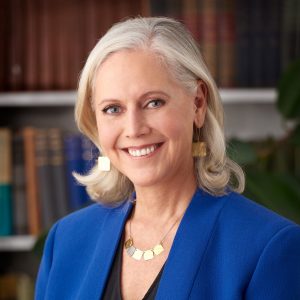

Theologian Serene Jones has written the book on grace — three times actually.
“I think grace is in the title of everything she’s written,” said Krista Tippett, journalist, creator of The On Being Project and curator of Week Seven’s morning lecture series. “She’s really wonderful about the complexity of this notion and drawing in the great tradition of theology around it.”
Jones will appear in conversation with Tippett at 10:45 a.m. today in the Amphitheater, as part of Week Seven, “Grace: A Celebration of Extraordinary Gifts — A Week in Partnership with Krista Tippett and ‘On Being.’ ”
Jones is the president of the Union Theological Seminary in New York City, the first female president in the seminary’s 180-year history. She formerly taught theology at Yale Divinity School.
Her past books include Feminist Theory and Christian Theology: Cartographies of Grace and Trauma and Grace: Theology in a Ruptured World. Her theological memoir, Call it Grace: Finding Meaning in a Fractured World, came out this year.
When Tippet began planning this week’s speaker lineup, she knew exactly who to call.
“Serene was my first thought,” she said, “because she did write this great book, and it is so on-topic.”
Jones is excited to return to Chautauqua, having preached at the Institution several years ago.
“I love the community,” she said. “It’s such a beautiful place with such an important history. I look forward to seeing old friends and meeting new ones.”
Jones didn’t set out to write a memoir; she wanted to write a book that introduced the layperson to some of the theologians that had been most formative for her beliefs.
“As I began to write that introduction to theology, I realized that I could not explain those theologians without explaining why they have been important in my own personal life,” she said.
The memoir follows her spiritual journey from her childhood in Oklahoma to present day. Along the way, she discusses the teachings of John Calvin, Søren Kierkegaard, James Baldwin, Saint Teresa of Ávila and more.
“It’s a great loss to our society that many of these theologians are no longer read or taken seriously,” she writes in the book’s introduction. “Their teachings make sense of so many of the troubles we face; to not read them is to close off access to the very truths that may save us. Time and again, they have saved me.”
Jones credits growing up in the Disciples of Christ denomination as a reason for her focus on grace.
“In that denomination, it’s a central concept and a central reality,” Jones said. “So I grew up with it being a big part of my theology.”
The concept boils down to a simple definition:
“(Grace) is God’s radical, unconditional love,” Jones said, “for all humanity and all creation.”
She hopes Chautauquans will leave the morning lecture with a better understanding of the reality of grace.
“I think grace is very personal, but it also can be political,” Jones said. “I think if one accepts that all human beings and all creation is radically loved, it changes in profound ways the way you interact with other humans beings and the world around you.”




